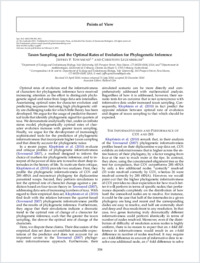Taxon Sampling and the optimal rates of evolution for phylogenetic inference
- Townsend, Jeffrey P. Department of Ecology and Evolutionary Biology, Yale University, New Haven, CT, USA
- Leuenberger, Christoph Département de mathématiques, Université de Fribourg, Switzerland
-
08.02.2011
Published in:
- Systematic Biology. - 2011, vol. 60, no. 3, p. 358-365
English
Optimal rates of evolution and the informativeness of characters for phylogenetic inference have received increasing attention as the effort to distinguish phylogenetic signal and noise from large data sets intensifies. Ascertaining optimal rates for character evolution and predicting sequences featuring high phylogenetic utility are challenging tasks for which little theory has been developed. We argue for the usage of predictive theoretical tools that identify phylogenetic signal for quartets of taxa. We demonstrate analytically that, under an infinite states model, phylogenetically optimal rates of character evolution increase with greater taxon sampling. Finally, we argue for the development of increasingly sophisticated tools for the prediction of phylogenetic informativeness that incorporate higher taxon sampling and that directly account for phylogenetic noise. In a recent paper, Klopfstein et al. (2010) evaluate and critique profiles of phylogenetic informativeness ( Townsend 2007), a method designed to inform the choice of markers for phylogenetic inference, and to interpret of the power of data sets to resolve short deep internodes in the history of life. To motivate their critique, Klopfstein et al. (2010) provide two analyses. First, they profile the phylogenetic informativeness of CO1 and 28S rRNA and reconstruct phylogeny for diplazontine parasitoid wasps. Second, they perform simulations to test the optimal rate of character change against a prediction based on four-taxon theory in Townsend (2007), addressing data sets of increasing numbers of taxa. With regard to their empirical data set, Klopfstein et al. (2010) find fault with the relation between the quartet-based ( Townsend 2007) phylogenetic informativeness profile and the results of phylogenetic inference. Furthermore, they argue that their simulations indicate a dramatic trend in the optimal rate of change of a character for phylogenetic inference, such that the greater the taxon sampling, the slower the optimal rate of change of the characters. Here, we dispute these claims. …
- Faculty
- Faculté des sciences et de médecine
- Department
- Département de Mathématiques
- Language
-
- English
- Classification
- Biological sciences
- License
-
License undefined
- Identifiers
-
- RERO DOC 21798
- DOI 10.1093/sysbio/syq097
- Persistent URL
- https://folia.unifr.ch/unifr/documents/301692
Statistics
Document views: 154
File downloads:
- Document: 413
